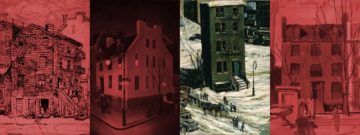David Mikics in Tablet:
 Americans love to look on the bright side. We process our traumas and congratulate ourselves on our resilience. We like to crown ourselves winners, avoiding the stigma of the L-word deployed by a certain ex-president. The triumph of the therapeutic, as Philip Rieff called it, even applies to our anti-free-speech college students, who gain vituperative strength from the harm supposedly inflicted on them by other people’s disagreeable opinions.
Americans love to look on the bright side. We process our traumas and congratulate ourselves on our resilience. We like to crown ourselves winners, avoiding the stigma of the L-word deployed by a certain ex-president. The triumph of the therapeutic, as Philip Rieff called it, even applies to our anti-free-speech college students, who gain vituperative strength from the harm supposedly inflicted on them by other people’s disagreeable opinions.
But there’s a dark flipside to the story. Americans can’t turn their eyes away from failure. No one is so interesting to us as the person, preferably a celebrity, who has sunk to the most degraded, soul-crushing Marianas Trench of existence, capsized, busted, shellacked, KO’d, and wiped out. Some truer sense of things seems to come with loss. The person wholly crushed by life is the one who knows the score. In failure, reality does not evade us.
American authors of the early 20th century speculated in failure the way the tycoons of their day bet on stocks. Theodore Dreiser, Willa Cather, Wallace Stevens, Ernest Hemingway, T.S. Eliot, William Faulkner, Robert Frost—these writers find illumination within pessimism, and so they are permanent members of the American canon. Twentieth-century American literature got off the starting block with the naturalist trio of Stephen Crane, Frank Norris, and Theodore Dreiser, who aimed a primitive sledgehammer at the notions of the progressive era. Progressives insisted that all human problems could be alleviated via social tinkering. Solidarity and peace would blossom, if reformers could only come up with the right formula for a just society.
But Dreiser and his contemporaries had a disillusioned sobriety that looked straight at the hard contours of reality: poverty, death, disease, sexual frustration, loss of love.
More here.
